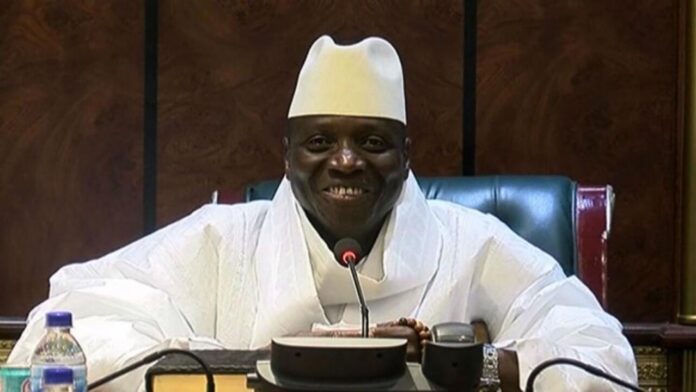Written by: Dawda Baldeh
While still in exile, eight years after his 22-year iron-fisted rule over The Gambia, former President Yahya Jammeh continues to exert significant influence over the country’s political landscape. From his base in Equatorial Guinea, where he has lived since January 2017, Jammeh has used social media—particularly WhatsApp—to organise large rallies in The Gambia and even sack executive members of his APRC party, which has since split into rival factions.
In this explainer, The Fatu Network chronicles The Gambia’s post-Jammeh political trajectory and how the country’s most controversial former leader continues to assert his presence from abroad.
After losing the 2016 presidential election to current President Adama Barrow, Jammeh initially refused to step down, prompting an ECOWAS military intervention. He was subsequently exiled to Equatorial Guinea under an agreement brokered by the African Union and ECOWAS to end the political crisis.
Not long after his departure, remnants of the Alliance for Patriotic Reorientation and Construction (APRC) began calling for his return, praising him as a “builder of bridges.” In 2020, thousands of Jammeh supporters marched across the Greater Banjul Area demanding his return. “He can come as a private citizen and stand for election and win. He can also become the president. We want him to be the president of this country. We see what he has done. We have seen it. He is a peaceful man,” one supporter said of the former leader—widely known for his repressive rule.
Indeed, the man who once sat at the epicentre of Gambia’s political power and intrigue is relishing the idea of returning home. From the comfort of his farm in Equatorial Guinea, Jammeh told thousands of supporters via a recorded WhatsApp audio that he would “soon return.” He added, “I don’t want any violence. I don’t want anyone to touch anything or destroy anything. The agreement must be implemented,” referencing what he claims is a deal with the African Union that would facilitate his return.
Before the 2020 rally, Jammeh had already made his intentions clear to supporters in Kanilai, declaring via WhatsApp, “From today, I want to take full leadership of the party as outlined in the APRC Constitution. I am the supreme leader, the flagbearer, and the party chairman, and I want to make this very clear.” This was his first public statement since leaving power in January 2017.
Jammeh, who insists he remains the party’s supreme leader, expelled seven executive members from the APRC faction. In a January 22, 2025 WhatsApp message, he announced he had taken control of his faction and dismissed interim leader Yahya Tamba. In February, he again removed one of his loyalists, Bakary Badjie, just days after Badjie declared his intention to run in the 2026 presidential election.
On several occasions, Jammeh has released audio messages criticising the Barrow-led government. In one such message, he accused Senegalese Prime Minister Ousmane Sonko of stealing Gambia’s natural resources, including oil—an allegation that further intensified public debate on the matter. While rights groups, opposition parties and civil society continue to demand transparency around Gambia’s natural resources, President Barrow has publicly denied any collusion with Senegal over oil dealings.
More recently, Jammeh released a 56-minute WhatsApp audio in response to rumours that he had endorsed Foni Berefet lawmaker Amie Colley’s affiliation with Barrow’s National People’s Party (NPP), a claim he firmly denied.
APRC Factions and ‘Unholy’ Alliances
After Jammeh’s departure, APRC deputy leader Fabakary Tombong Jatta took over the party’s leadership. On 4 October 2021, the APRC announced an alliance with President Barrow’s National People’s Party (NPP). The announcement sparked widespread criticism from activists and victims of Jammeh’s regime, who denounced the alliance due to the human rights abuses committed under Jammeh’s rule.
Jammeh, speaking again via WhatsApp from exile, condemned the alliance as “unholy” and distanced himself from it. He went further, dismissing leading members of the party, including Tombong Jatta. Despite Jammeh’s objections, the Independent Electoral Commission (IEC) continued to recognise Tombong as the official party leader. Those Jammeh sacked remained loyal to Tombong, while the other faction—known for its “No to the Alliance” stance—rallied behind Yahya Tamba.
Instead of aligning with Barrow’s camp, Jammeh declared his faction’s alliance with the Gambia Alliance for National Unity (GANU), led by his former Justice Minister, Sheikh Tijan Hydara.
APRC Divided
While Jammeh vehemently rejected the APRC-NPP alliance, President Barrow defended the partnership, stating it was in the national interest. Once one of The Gambia’s most powerful political parties, the APRC now faces serious fragmentation.
2022 National Assembly Elections
Leading up to the 2022 National Assembly elections, both APRC factions fielded candidates. The faction led by Yahya Tamba won five seats in the Foni region—Foni Jarrol, Bondali, Kansala, Berefet, and Bintang—all strongholds of Jammeh, though they contested as independent candidates. Meanwhile, the Fabakary-led APRC, still recognised by the IEC, secured two seats in Jeshwang and Bundungka Kunda, both located in the Kanifing Municipality.
Conclusion
The Gambia’s political chapter with Yahya Jammeh is far from closed. The next chapter—whether it involves his return, potential prosecution, or continued exile—remains uncertain. Will Jammeh be held accountable for the atrocities he is accused of, or will Gambians choose to move on and consign his authoritarian legacy to history? Only time will tell.




